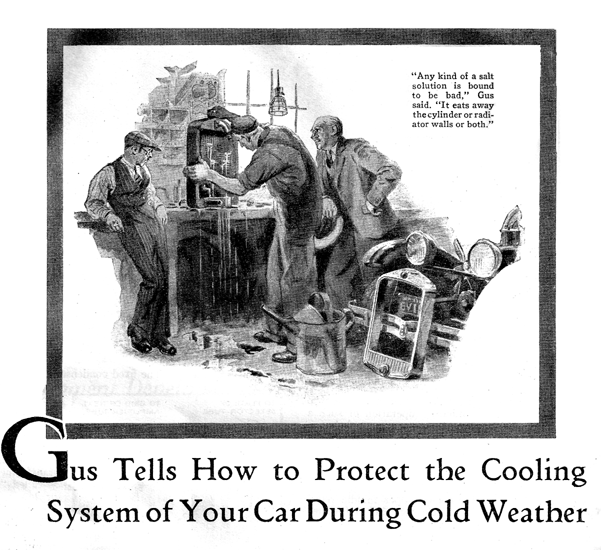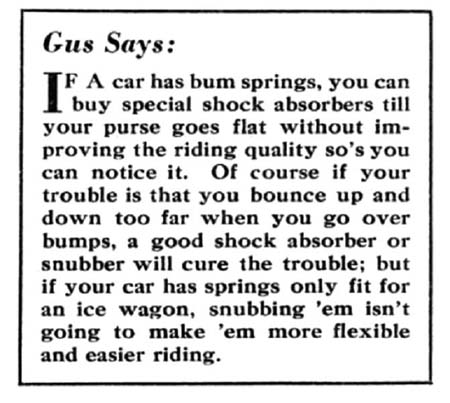December 1930
WHAT YOU SHOULD KNOW ABOUT ANTIFREEZE
by Martin Bunn

"Hello, Gus!" called Jim Backson, the asthmatic proprietor of the town's commercial hotel, as he steered his car into the Model Garage one frosty morning.
Gus Wilson, half owner and auto mechanic of the establishment, unwrapped himself from around the motor on which he was working.
"Well Jim," he said, "what's eating the bus this morning? Frozen radiator, maybe?"
"Naw, nothing like that," Backson puffed as he squirmed from under the steering wheel. "Just a tiny leak you ought to be able to fix in a couple of minutes."
Gus walked over and inspected the radiator. "Ain't no such thing as a little leak in an auto radiator -- leastways when it comes to getting it fixed," he observed. "Generally takes just as long to fix a little one as it does a thumping big one. Got time to wait while I do the job?"
"Yeah. I guess so. Business is pretty slack right now," Backson grunted, tossing his overcoat into the car and draping himself comfortably on the edge of the workbench.
"Be sure to save the antifreeze solution, Gus," he cautioned.
The veteran auto mechanic shoved a pail under the drain cock and turned it on. He had to poke it with a piece of wire before the flow started.
"Say, what kind of slop is this, anyhow?" he growled, eyeing the slow dirty trickle.
"Oh, that's some swell antifreeze I grafted off a fellow who stopped at the hotel," Backson replied. "He says it's great stuff. Guaranteed not to freeze no matter how cold it gets!"
Gus merely grunted and made no further comment as he removed the radiator shell and the radiator itself.
"Now we'll give it a real cleaning out," he said as he carried the radiator over to the washstand and attached a special fixture to the lower hose connection.
"What's that gadget?" Backson inquired.
"Latest thing to clean radiators," Gus replied. "Water goes in the big pipe and the little one is connected to the air pressure line. Shooting air in with the water in short bursts fills the radiator with a churning mixture of water and bubbles that loosens the sludge and rust better than ordinary flushing out-'specially when you shoot the water and air into the bottom of the radiator. I'll do the cylinder jacket the same way when I get through with this."
"Is it very complicated inside?" Backson asked.
"No, it's only a casting with a passage cored in it so the stream of air comes out of a fine nozzle in the middle of the stream of water."
When Gus noted that the water issuing from the top of the radiator was clear, he replaced the water and air injector with a cork, filled the radiator with water and set it on the bench.
"Jiminy!" gasped Backson. "You've put the whole works on the blink. Look at it leak. Must be at least a dozen holes. what happened?"
"That's what the swell antifreeze did," Gus grumbled as he gently poked at the leaks with the end of a screwdriver. "See, the metals all eaten away. Cleaning it uncovered a lot of places that were just held closed by the dirt. It's too far gone to fix properly."
"I'll be hanged if I listen to any more of them windy salesmen," snorted Backson disgustedly. "What's in that antifreeze, acid or something?"
"It's just a salt solution," Gus replied. "Not ordinary table salt-anybody would have more sense than to use that, but another kind of salt that isn't near as corrosive as table salt. Any kind of a salt solution is bound to be bad. It makes the radiator and cylinder block, which are different kinds of metal, act as an electric battery. Either the inside walls of the cylinder jacket or the inside of the radiator, sometimes both, are eaten away."
"All right," said Backson with a rasping sigh, "I'm stuck for a new radiator. Now I suppose I'll have to go back to alcohol and have the car smelling like a bootlegger's bus every warm spell. I thought I had it fixed so I wouldn't have to spend all winter worrying whether there was enough antifreeze in the radiator."
Gus laughed. "Alcohol won't eat out the radiator at any rate, and it's relatively cheap, too. The big trouble with alcohol is that it evaporates like fog under a strong sun if you run the motor just as hot in winter as you do in summer. And if you don't run the motor that warm you're piling up trouble from crank case dilution, poor lubrication, and so on."
"Sort of between the devil and the deep blue sea, with alcohol, aren't you?" Backson chuckled. "Isn't there any way to use alcohol without all that trouble?"
"The only way I know of that really works," said Gus as he prepared to clean out the cylinder block, "is to fit the radiator cap air-tight, then run a nice long extension on the overflow pipe into a can fastened somewhere under the chassis so it'll stay cool. Make sure that the pipe sticks down into the can almost to the bottom."
"Then when the alcohol boils off it'll condense in the long pipe and run into the can. When the motor cools off after a run, the alcohol vapor above the solution in the radiator turns into liquid and that makes a vacuum so the air pressure pushes the alcohol in the can back up the pipe into the radiator again."
"Sounds too complicated to me," Backson wheezed.
"Most of the people would think so," Gus smiled. "It's a good system, though, if it's installed right. If you're worrying about the alcohol evaporating, why don't you use something that doesn't evaporate. Say glycerine or ethylene glycol?"
"Nix!" snorted Backson. "The hotel business isn't so hot right now and besides my grandmother was Scotch. Every time I think about forking over a five spot just for anti-freeze, I get a cramp in the pocketbook."
"Huh!" Gus growled. "Maybe that kind of cramp is better'n the shriveling it's going to get from this radiator job."
"Besides," Gus continued, "if you're going to do much driving in winter, alcohol isn't cheap in the end. One filling of glycerine or ethylene glycol lasts all winter no matter how much you drive or how many hot spells there are. On top of that there's nothing to stop you from draining off the solution in the spring and using it again next winter and the winters after that for as long as you want. When you drain it out the solution will be dirty, of course, but the dirt will settle out during the summer and by the following fall it will be just as good as ever."
"Sounds like some of them million profit oil prospectuses." Backson jeered. "How about leaks? There's always a leak somewhere and by spring there won't be any solution left to drain off."
"But why have a leaky cooling system?" Gus argued. Leaks are a sign of sloppy work. The cooling system ought to be as tight as a drum. It's just a matter of getting the hose connections tight, the cylinder head gasket right, and so on."
"How about the pump? Mine always leaks around the shaft. I'll bet you a good smoke you can't make it stop for more than a day or so."
Without replying Gus set to work to remove the pump. "Here you are, Jim," he said as he pulled out the pump shaft and held it up to the light. "See how it's all rough and scored? You can't pack a pump shaft like that so it won't leak. Let me put in a new shaft and promise me you won't forget to grease it and I'll guarantee that it won't leak more'n two drops all winter."
"Maybe I'll try it if you're as sure as all that," Backson finally agreed.
"What you've got to do," Gus went on, "is to kind of sew up the cooling system for the winter. Get every joint so it doesn't leak and then fix it so's nobody can disturb things. That means fit the filler cap so you can fasten it closed. Then the bird in the filling station can't upset things by filling the radiator solution with water every time you get gas."
"Once you've filled the radiator with the proper solution of glycerin and water or ethylene glycol and water to within a couple inches of the top, you won't want to add any water except to replace what evaporates. If you go filling the radiator so it overflows every now and then, you'll soon lose all the antifreeze out the overflow pipe. That's because the cold solution doesn't take up as much space as it does after it gets hot from running. Also, I'm going to wire the drain cock in the closed position so that there'll be no danger of its being opened accidentally and the solution draining away."
"How much evaporation will there be?" Backson asked.
"If you use your car for only short trips, sort of taxi service, there won't be enough water evaporation to bother about all winter. If you go on long trips, stop here once a month and we'll check the level and add water if it's needed. Only the water evaporates, anyhow."
"Now about keeping the motor warm enough. If you have a dash type thermometer it's a cinch. Just cover up enough of the bottom of the radiator to make the thermometer read the same as in summer. If you haven't any thermometer, cover up the lower third. That'll average about right in this climate."
"What do you mean by dash thermometer?" questioned Backson. "Isn't that thermometer on the radiator cap good enough?"
"I should say not!" replied Gus emphatically. "That thermometer won't come within anywhere from twenty to fifty degrees of the actual water temperature on a real cold day. It's only good as a warning signal to show when the water boils. Trouble is, the cold air streaming past when the car is moving makes it read too low."
"I'm sold," Backson wheezed. "Fix it up when you get the new radiator and I'll go home and find me a nice can so I'll be all ready to drain out that solution next spring!"
END
L. Osbone 2019
